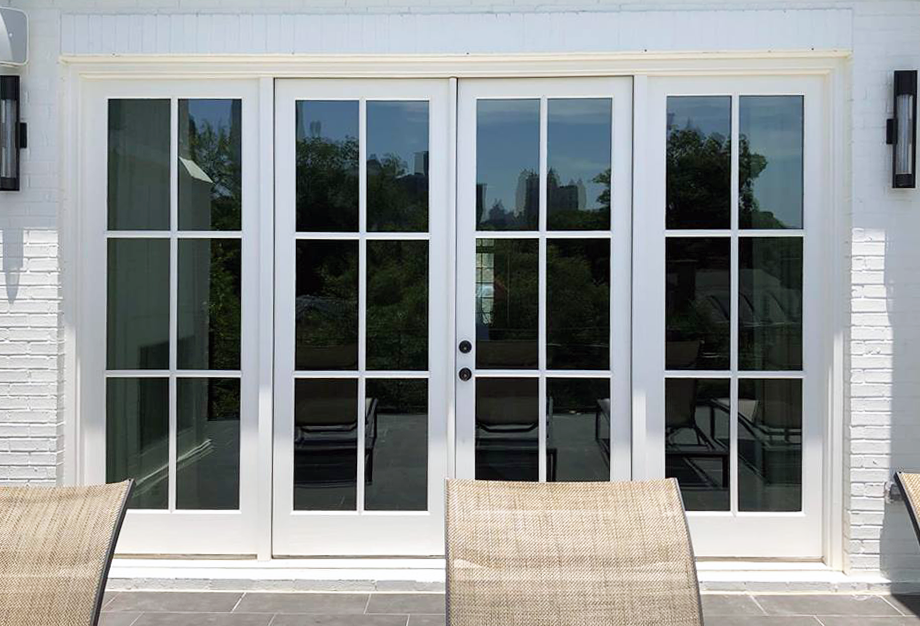Get Expert Guidance on Selecting the very best Residential Window Tint for Your Requirements
Get Expert Guidance on Selecting the very best Residential Window Tint for Your Requirements
Blog Article
Exactly How Residential Home Window Tinting Enhances Your Home's Energy Efficiency
Residential window tinting provides an engaging remedy for homeowners looking for to enhance energy effectiveness within their living rooms. By using specialized movies to windows, it properly lowers heat transfer, thus supporting indoor temperature levels and reducing the demand for too much home heating or air conditioning.
Understanding Window Tinting
Understanding window tinting is necessary for home owners seeking to improve both comfort and energy efficiency in their home. Residential Window Tint. Window tinting entails the application of a slim movie to the inside or exterior surface of glass home windows. This movie can significantly regulate the amount of sunlight and warm that goes into a home, therefore influencing indoor environment conditions
There are various kinds of home window tinting films offered, each with distinct properties. The performance of window tinting is often measured by its Visible Light Transmission (VLT) percentage, which suggests how much light can pass via the film.
Advantages of Energy Efficiency
Window tinting not just enhances looks however also plays a substantial function in boosting energy performance within household areas. By lowering heat transfer via windows, tinted movies create a much more secure indoor environment, which can cause significant reductions in power consumption for heating and cooling. This power performance translates right into reduced energy bills, giving property owners with significant long-term cost savings.

In addition, window tinting boosts the convenience of living spaces. By minimizing glow and blocking dangerous UV rays, tinted home windows create a more positive atmosphere, which can result in enhanced well-being for passengers. The security against UV rays additionally assists preserve furnishings and floor covering from fading, adding to the durability of house products.
How Tinting Functions
Tinting movies operate via a combination of innovative materials and technologies developed to control the amount of solar power going into a home. Largely composed of polyester, these films frequently include ceramic or metallic fragments that soak up and reflect warm. This twin capability enables them to significantly decrease the infiltration of ultraviolet (UV) rays and infrared radiation while allowing noticeable light to go through.
The performance of window tinting is determined by its solar warmth gain coefficient (SHGC), which indicates just how much solar power is transferred via the window. Lower SHGC worths are preferable as they signify better heat being rejected. Furthermore, home window colors can feature a range of tones, permitting property owners to personalize their visual choices while enhancing energy effectiveness.
Furthermore, these films act as an obstacle, protecting against warmth loss during colder months by reflecting interior warmth back into the home. This thermal insulation result enhances the air conditioning advantages acquired during warmer months, contributing to a balanced indoor climate year-round. By taking care of solar power effectively, household window tinting not only improves comfort but also plays an important function in decreasing energy consumption and lowering utility bills.
Choosing the Right Color

There are different kinds of window movies offered, consisting of dyed, metalized, and ceramic. Dyed films are cost-efficient however might have limited longevity. Metalized films use far better heat being rejected yet can disrupt electronic signals. Ceramic movies offer superb heat control without compromising exposure and are highly long lasting, making them a preferred choice.
Visible light transmission (VLT) is content another critical factor, as it indicates the amount of natural light that can pass through the tinted glass. Property owners ought to choose a tint with a VLT that matches their lighting preferences while still offering appropriate glow reduction.
Furthermore, evaluating the solar warm gain coefficient (SHGC) can assist establish just how well a color can block heat from sunlight. A reduced SHGC shows far better warmth control, inevitably improving energy efficiency.
Installment and Maintenance Tips
Correct setup and maintenance are crucial parts in optimizing the advantages of domestic home window tinting. Specialists additionally utilize specialized strategies and devices, which can boost the toughness and performance of the tint.
Adhering to installation, maintenance is essential to lengthen the life of the window movie. It is recommended to wait at the very least 30 days prior to cleaning up the tinted home windows to permit the glue to treat fully.
Furthermore, regular inspections are beneficial. Look for any kind of peeling or bubbling, which might show incorrect setup or put on in time my response - Residential Window Tint. Dealing with these problems without delay can protect against more damage and maintain power effectiveness. By adhering to these installment and maintenance tips, home owners can guarantee their home window tinting remains to give considerable power financial savings and convenience for years to find.
Conclusion
In final thought, property home window tinting offers as a reliable solution for enhancing energy efficiency within homes. By lowering heat read more transfer and blocking dangerous UV rays, window films contribute to decrease power usage and boosted indoor convenience.
Window tinting involves the application of a thin film to the interior or exterior surface area of glass home windows. By minimizing warm transfer with windows, colored movies produce a more secure indoor environment, which can lead to substantial reductions in power consumption for heating and cooling.The effectiveness of home window tinting is determined by its solar heat gain coefficient (SHGC), which indicates how much solar power is sent via the home window. By handling solar power effectively, residential window tinting not only enhances comfort but also plays an essential duty in minimizing energy consumption and decreasing energy bills.
By decreasing heat transfer and blocking dangerous UV rays, home window movies contribute to lower energy consumption and improved indoor convenience.
Report this page